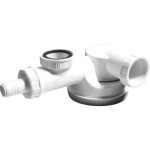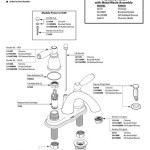Bathroom Sink Faucet Won't Turn Off: Troubleshooting and Solutions
A bathroom sink faucet that won't turn off completely can be a frustrating and inconvenient issue. It can lead to wasted water, potential damage to your bathroom floor, and create a constant dripping sound that disrupts peace and quiet. Fortunately, this problem is often caused by relatively simple issues that can be addressed with basic tools and a little know-how. This article will guide you through the common causes of a bathroom sink faucet that won't turn off and provide practical solutions for each.
1. Worn Out O-Rings and Washer
One of the most frequent culprits behind a leaky faucet is worn-out O-rings and washers. These small rubber components serve as seals within the faucet mechanism, preventing water from leaking out when the faucet is turned off. Over time, these components can become brittle, cracked, or deformed due to constant use and exposure to water. When this happens, the faucet handle can feel loose, and the O-rings and washer no longer effectively seal the water flow.
To address this issue, you'll need to replace the worn-out O-rings and washer. This process typically involves disassembling the faucet handle, accessing the cartridge or stem containing the O-rings and washer, and replacing the damaged components with new ones. For easier replacement, you can refer to the manufacturer's instructions or consult a helpful online guide.
2. Cartridge or Stem Issues
If replacing the O-rings and washer doesn't solve the problem, the issue could lie within the faucet cartridge or stem itself. The cartridge or stem contains the internal mechanism that controls water flow and is responsible for turning the faucet off. It can become worn, damaged, or calcified due to mineral deposits from hard water.
In such cases, replacing the entire cartridge or stem is necessary. The process involves disassembling the faucet handle and removing the old cartridge or stem. Ensure you carefully identify the correct replacement cartridge or stem for your specific faucet model before purchasing. After replacing the cartridge or stem, reassemble the faucet and test for leaks.
3. Clogged Aerator
A clogged aerator can also cause a bathroom sink faucet to leak. The aerator is a small, removable screen situated at the faucet's spout. It mixes air with water, creating a smooth, non-splashing stream. Over time, mineral deposits, debris, and sediment can accumulate in the aerator, restricting water flow and causing leaks when the faucet is turned off.
To address this issue, unscrew the aerator from the spout using pliers or a wrench. Clean it thoroughly by soaking it in vinegar or a commercial descaler solution. Rinse the aerator thoroughly and reattach it to the spout. If the aerator is severely damaged or beyond cleaning, you'll need to replace it with a new one.
4. Loose or Worn Valves
Loose or worn valves within the faucet mechanism can also lead to a leaky faucet. The valves are responsible for regulating water flow and shutting off the water when the faucet is turned off. If they become loose or worn, water can continue to flow even when the faucet is in the off position.
To address this issue, you might need to tighten the valves or replace them entirely. This procedure usually requires disassembling the faucet and accessing the valve mechanism. However, attempting to repair valves yourself is often complex and can damage the faucet further. Consider consulting a professional plumber for this specific repair.
In conclusion, while a bathroom sink faucet that won't turn off can be a frustrating issue, it's often caused by simple problems that can be addressed with basic troubleshooting. The most common causes include worn-out O-rings and washers, cartridge or stem issues, clogged aerator, and loose or worn valves. By understanding these causes and following the recommended solutions, you can fix the problem and have a working faucet again.

Bathroom Sink Faucet Won T Stop Running Doityourself Com Community Forums

My Kitchen Faucet Won T Turn Off

Faucet Won T Turn Off Tips From A Houston Plumber Santhoff Plumbing

Faucet That Won T Shut Off

Hot Water Faucet Won T Turn Off Because I Accidentally Left On During Stem Removal Terry Love Plumbing Advice Remodel Diy Professional Forum

Four Reasons Why Your Faucet Won T Stop Dripping Service Plus Plumbing

Bathtub Faucet Won T Turn Off What To Do Alpha Building Inspections

Why Is My Bathroom Sink Faucet Won T Turn Off Ysis And Fixing Process

Bathtub Water Faucet Won T Turn Off

Fixing Faucets How Do I Fix Water That Keeps Running In A Tub Faucet
Related Posts







